This will not shock those that know me well, but sometimes I can be pretty dumb.
As analytical and scientific as I think I am, there are several mistakes I continue to make despite overwhelming evidence that they are the wrong courses of action. (Incidentally, I think that’s the definition of insanity).
One such doltish instance is continuing to bring peanut butter into my apartment. Each time I buy it (the crunchy kind, of course), I tell myself that I’ll be able to portion control. But, each time, I fail impressively. The inexplicable godliness that comes from the simple crushing of peanuts[1] somehow prevents me from eating anything less than half-jar servings.
Another example, and much more relevant to this article, deals with reading. The mistake is this: I avoid reading highly regarded, popular books because I think that I already, more or less, know what’s in them. I say, eh, I’ve already read a few articles or heard a podcast with the author— and like Cousin Vinny, I think…I get… the point.
It’s the classic book-by-its cover mistake. And I make it all the time.
I’m like Good Will Hunting (Matt Damon) when he sees one painting by his therapist Shawn (Robin Williams) and infers that Shawn probably married the wrong woman. “If I asked you about love,” Shawn mocks Will later on, “you’d probably quote me a sonnet….Do you think I know the first thing about how hard your life has been,” Shawn says, “because I read Oliver Twist!?”
Similar to good Will, I see one little painting of the book, and then, I rip its fucking life apart.
A classic blunder was Malcolm Gladwell’s, Outliers. By the time I read it, which was in maybe 2014 or ‘15–seven years after its publication– it had already sold millions of copies. And everyone and their mother was talking about 10,000 hour rule this and 10,000 hour rule that. So I was like Vinny again— ok, I think I get the point.
But, if you’ve read the book, or my article on it, you know that the 10,000 hour thing is completely taken out of context. First, most people misunderstand that rule. And second, it really has nothing to do with the real value of the book, anyway.
This happens every single time I end up—in spite of myself— reading a book like this. I realize (again), like Vinny or Will, that the thing I thought I was the thing was actually not the real thing.
This year, thankfully, I overcame my stupidity once more by reading several popular books that I’d been avoiding. Two examples being Educated by Tara Westover and Isaacson’s Steve Jobs (more on both below). And true to form, as much as I knew and had heard and read about either subject— Westover or Jobs— I really had no idea about them.
What’s my point?
First, never—under any circumstances—should you purchase crunchy peanut butter without a comprehensive management plan in place. Unless you have an allergy, an inhuman self-control, or a lockbox under someone else’s custody, just push your metal cart right past the Justin’s and the Jiff.
Second, don’t be like me, Vinny, or Will. Don’t avoid reading something because you assume ‘you get the point.’ You almost certainly do not— not the real point, anyway.
And don’t make the correlated mistake— to assume that a book is too irrelevant to you without giving it at least a small shot. There’s advice out there (including from people I admire) to read “just in time” or “right now” books—ones that are obviously and immediately useful to you. But this advice, ambitiously, presumes the ability to know what you need at any given time. And, to our point, it requires you judge a book by its cover– an exercise fraught with ignorance. (Mostly mine).
What, after all, did the 800-page biography of Alexander Hamilton have to do with Lin Manuel Miranda in 2008?
Nothing. Miranda knew approximately zero about Hamilton besides the fact that he had died in a duel[2]. That led to him buying the book, on a whim, for a vacation he was taking from his first Broadway hit, In The Heights. Miranda read the first chapter and was electrified. He immediately, somehow, recognized in the life of a white, 18th century statesman, his Puerto Rican father, his Queens upbringing, and hip-hop. Inspired, he wrote the four-minute White House performance, and proceeded to change the world.
What’s your next Hamilton? The only way to find out is to read ‘untimely,’ ‘irrelevant’ books.
End of lecture. Start of best books list. Break out the crunchy peanut butter.
***
The List
I start the list of with biographies.
At some point over the past few years I decided that a great biography has all I am looking for in a book— story (entertainment + relatability), insights, and inspiration. So I decided to read a lot more of the people who seemed to possess something I was after, or wanted to understand. And some, who I sort of want to be.
We’ll start with the bios, and then it’s sort of a grab-bag after that. I’ll conclude with some honorable mentions.
Let’s go.
Biographies
Will, Will Smith (with Mark Manson)
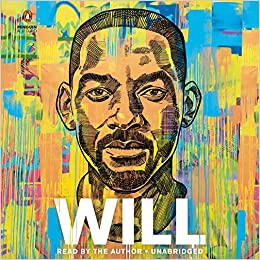
When Will was young, his Dad hit his mom.
“He hit her again, knocking her to the ground. She stood right back up, looked him in the eye, and calmly said, ‘hit me all you want, but you can never hurt me.”
But Will didn’t jump in to defend her.
“Everybody in my house could fight. Except me…In a family of fighters, I was the weak one. I was the coward….I just stood there. Frozen… this was the first time I had been aware of my own inaction…Yet, I did nothing.”
The thing is, Will, it seems, never got past this cowardly insecurity.
“No matter what I have done,” Will said, “no matter how many box office records I’ve broken, there is that subtle and silent feeling always pulsating in the back of my mind: that I am a coward; that I have failed; that I am sorry, Mom-Mom, so sorry…. That night…at only nine years old..I decided. I made a silent promise….One day, I would be in charge. And this would never, ever happen again.” [Emphasis mine].
Had you read that prior to The Slap, would his acceptance speech about “I was supposed to protect…” have made more sense? Perhaps.
I read this book along with my brother and cousin in December 2021, months before The Slap. We all really liked it (though it was a little over-written and romantic perhaps). Especially listening to Will read the audio.
But, after the Slap, my cousin posed a question to me: did it ruin the book for me? Did it make me feel like he wasn’t being genuine in the lessons he claimed to have learned? Did it make me sad that I looked up to Will, and maybe even more so after reading the book, but that then he did something wrong? Do I now look down on him?
Not exactly.
Don’t get me wrong, The Slap did impact me. It upset me, in fact. But not in the way you might think.
I didn’t think less of the book. And I definitely don’t think Will was being inauthentic– I mean, look at the quotes above, he practically told us it was coming. And Will isn’t unique. Many of my heroes in one respect (Tiger, MJ, Arnold, Lincoln, Hemingway, Camus, Jim Carey) have done things that are either horrible, destructive, or just things I don’t want to do. You die a hero, or you live long enough to see yourself become the villain.
If Schwarzenegger cheated on his wife, does that mean he was lying in Total Recall (the book) when he said that he believes in integrity? I’ve taken a lot from Hemingway books over the years. Should I throw those things away because he was mercurial, a not-so-great husband, and that he shot himself in the head?
No. I don’t think so.
Mistakes are made. Even egregious, seemingly crazy, and public mistakes. Emotions and depression and misunderstandings and family problems (and maybe temporary insanity) get in the way of better selves.
To say that The Slap makes you think less of Will, or that you won’t see his movies— I think you have to then be prepared to examine yourself. Are there things that you want to be, maybe even usually are, but that you have also sometimes forsaken? Have you acted in ways that aren’t representative of your more thoughtful, compassionate self?
I know I have.
Not a lot of people know about this—in part because I was and remain embarrassed by it— but I once crashed my car into the wall on the highway. That’s right. I fell asleep at the wheel at four or five in the morning while driving the stretch of I-95 that connects DC and Baltimore. I hit the guard rail, stuck to it for several hundred yards, and totaled my car. I could have easily died.
Does that mean that if I say that I either am (or want to be) a responsible, thoughtful person, that I am lying? Maybe it does. But I hope it doesn’t.
I hope what it means is, look, I want to be this ideal version of myself, and a lot of the time, I am nearing it, or at least not detracting from it. But occasionally, usually when I’m tired, or sad, or angry, I do things or think things that I don’t advocate. Even bad things. And I hope you overlook those as aberrant, rather than definitive.
Actually, the way The Slap most impacted me was not about how Will acted, but what other people did, or didn’t do. To me, the paralyzing question is this: would you have stood up for Chris Rock?
I mean, it’s easy to say that you would, and you, of course, hope you would. But, be real with yourself— or try to be. Would you have? Definitely? With no one else doing anything? With Denzel giving Will a pep talk? No security?
For me, I’m not so sure. And that worries me more than Will’s (stupid, outrageous, criminal) actions.
Steve Jobs, Walter Isaacson (Amazon)
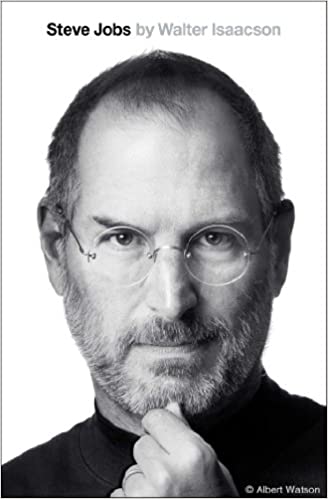
There were two aspects to Jobs I found especially compelling. In both, he seemed to be able to thread the needle of two different extremes.
First, his famous “reality distortion” trick and second, his ability to have many interests but maintain focus and priority. A quick word about both.
“In most cases,” Jobs once said, “strengths and weaknesses are two sides of the same coin. A strength in one situation is a weakness in another, yet often the person can’t switch gears.” And as far as I can tell, this is from experience. Because his own strength, it seemed to me, and I think to Isaacson — to be this outsized ability to both demand and inspire.
When he spoke, he spoke with a largeness of vision and such confidence, that he dazzles even the jaded and undazzleable. This skill is often paired to what people call Steves “reality distortion field.” “The reality distortion field,” Isaacson wrote, “was a confounding melange of a charismatic rhetorical style, indomitable will, and eagerness to bend any fact to fit the purpose at hand.” The ability to hypnotize people with some sort of cocktail of possibility, confidence, and intimidation. They’re inspired, but they’re also scared. And a lot of times— including with the iPhone, iPad and iTunes— this resulted in achievements most thought impossible.
The other side of this coin is ugly. For one thing, he is under his own spell. Like George Costanza advised— “it’s not a lie if you believe it.” And Steve believed his lies just the same as his dreams. And if others don’t believe it, not only are they wrong, but he sort of hates them. He treated people unkindly because of this.
“Steve had a tendency to see things in a binary way,” wrote Isaacson. “A person either was a hero or a bozo, a product was either amazing or shit.”
But this rose higher than mere unkindness. Including stealing from Steve Wozniak— the harmless brainiac and actual architect of the Apple computer. Woz built the Apple 1, Steve sold it. One of the first deals was with Atari, I believe. Steve made a deal for one number, but he told Woz that the payment was much lower, leaving Steve a much bigger share than he was entitled. Woz didn’t find this out until years later.
“I wish he had just been honest. If he had told me he needed the money, he should have known I would have just given it to him. He was a friend. You help your friends,” Woz said.
The second group of extremes he artfully balanced was, on the one hand his many interests, and on the other his ability to focus and prioritize. Jobs was a real life Renaissance Man. One reason Isaacson marvels at Jobs (and his other bio subjects) is because of his mixture of disciplines. He is at the nexus of art, business and technology. He had a working familiarity with all of them, and a sort of rebellious, outsider mentality that kept him away from convention.
The thing is though— he was dead set on simplicity and priority. So he had all of these interests and experiences— recall, at one point he was the CEO of both Apple and Pixar—but when it came to building something, he was more intent on eliminating options and focusing.
“Simplicity is the ultimate sophistication,” he said. “He would set priorities,” Isaacson wrote, “aim his laser attention on them, and filter out distractions…That focus allowed him to say no…and nurtured in him an ability aesthetic based on minimalism.”
This is quite a trick. And one that I took to heart. Because I feel like sometimes I have the former— the several interests and experiences and ideas part (not in a Jobsian genius way, but enough), but I don’t have the simplicity and focus part. A definite weakness.
Tara Westover, Educated (Amazon)
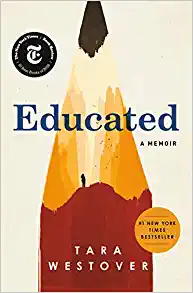
Jobs was adopted; Tara Westover probably wishes she was.
Her parents, devout Mormons and anti-organization, didn’t believe in doctors or schools or books, for the most part—other than the Mormon bible, and some select others that fit their ideology. Her mother was an herbalist and midwife, and homeschooled her children to some extent. Tara doesn’t know her actual birth date and up until college, never had heard of Michael Jordan or Martin Luther King Jr.
Ever since she was a child, her father was convinced that the apocalypse was approaching, so they buried food and water and depended on themselves for income and shelter. He owned a scrap yard, full of sharp and hot metals and heavy machinery. He compelled his children to work in that yard, jeopardizing their safety. On more than one occasion, blood was spilled, concussions sustained, death barely escaped.
And her family was abusive. Her father was emotionally abusive without knowing it, keeping women in women’s roles, and calling her a whore if she so much as rolled up her sleeves, showing the skin on her arm. Her brother wasn’t only emotionally abusive, but physically so. The abuse bordered on sexual and was sociopathic. Several times, he nearly killed her.
But the most fascinating part of this story isn’t as much about how bad this situation was for Tara – though it’s certainly horrifying. But how she found her way out of it.
About how she spent hours and hours teaching herself textbooks that her other brother (one that eventually got out of the house too) snuck into her room (her parents let her read only the Mormon bible). And how she managed, not just to get ‘educated’ — but from the best schools in the world (Oxford, Harvard). And about how she came to change her beliefs— most importantly, in herself.
“Everything I had worked for,” Westover wrote, “all my years of study, had been to purchase for myself this one privilege: to see and experience more truths than those given to me by my father, and to use those truths to construct my own mind. I had come to believe that the ability to evaluate many ideas, many histories, many points of view, was at the heart of what it means to self-create.”
To me, Educated is about the fickleness and, to some degree, randomness of beliefs. But also about their overpowering, blinding strength. But— and this is the crucial lesson— that you can use that same power of belief— in yourself, in hope—to not only get lost inside of a certain kind of hell, but also to break out of it.
Mark Cuban, How To Win At The Game of Business (Amazon)
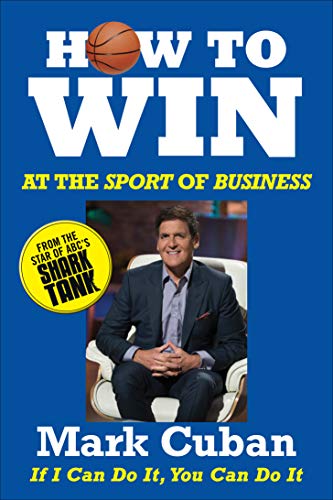
“It’s not about money or connections-it’s the willingness to outwork and out-learn everyone… And if it fails, you learn from what happened and do a better job next time”
Part tactical, part autobiographical, this book was a lot of fun. Story, teaching, and motivational.
One of the things I loved about the book was hearing about Cuban’s mentality before he was a billionaire. When he started his first business— one he eventually sold for (a pedestrian) six million dollars— he was just a salesman trying to convince people to let him help them with their tech. He had to, one-by-one, accumulate the trust of buyers with effort and expertise. In this way, you see Cuban as a regular, admittedly smart guy—but not a genius. What he had going for him was an irregular drive and nerve, and an ability to focus hard and long on a problem he was interested in— which was Einstein’s claim to fame.
Two tactical things that he said helped him build several businesses.
First, was he read everything he could about the industry. He stresses the need for an entrepreneur, or anyone to gain a competitive advantage in business, they need to understand that business (and business in general) inside and out. Because— and this is the competitive advantage— most people aren’t going to do it.
“In doing all the reading I learned a valuable lesson. Everything I read was public. Anyone could buy the same books and magazines. The same information was available to anyone who wanted it. Turns out most people didn’t want it…Most people won’t put in the time to get a knowledge advantage.”
Second, he came to understand the key to sales. That what you really need is a specific kind of empathy for the buyer. Not thinking about your product, but about what their key problems and interests are.
“What makes a good salesperson? Let me be clear that it’s not the person who can talk someone into anything. It’s not the hustler who is a smooth talker. The best salespeople are the ones who put themselves in their customer’s shoes and provide a solution that makes the customer happy.”
The Body: A Guide For Occupants, Bill Bryson
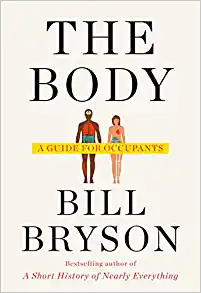
[Ok, not a technical biography, but it reads like one. Maybe the only true bio-graphy]
“That is unquestionably the most astounding thing about us—that we are just a collection of inert components, the same stuff you would find in a pile of dirt. I’ve said it before in another book, but I believe it’s worth repeating: the only thing special about the elements that make you is that they make you. That is the miracle of life.”
Let me paraphrase that adorable energy ball, Gary Vaynerchuck (more on whom below): There are two things you can do with content: you can either inform or you can entertain. Or, he adds, you can try to do both. And if you can manage to pull that off, you’re in a very special class of people.
Bill Bryson is not only in that special class, but he may be the valedictorian.
Bryson is one of those very few writers who can not only take a very complex subject and make it comprehensible— subjects like the history of the world (which I read and loved last year)— but he also, effortlessly, it appears, can wrestle those complicated notions into a sort of comedy. It’s like if you took the Magic School Bus, gave it an elevated, rye, whimsy, British-tinted sense of humor, and a PhD.
In The Body, Bryson explores our knowledge of our body, starting with cells and moving into systems, and organs, until arriving at the brain.
“The great paradox of the brain,” Bryson writes, “is that everything you know about the world is provided to you by an organ that has itself never seen that world. The brain exists in silence and darkness, like a dungeoned prisoner. It has no pain receptors, literally no feelings. It has never felt warm sunshine or a soft breeze. To your brain, the world is just a stream of electrical pulses, like taps of Morse code. And out of this bare and neutral information it creates for you—quite literally creates—a vibrant, three-dimensional, sensually engaging universe. Your brain is you. Everything else is just plumbing and scaffolding.”
He takes us through the history of the science, the many whacky stories of discovery and non-discovery, and what we currently agree on. Part of the fun comes from Bryson’s relatability— he’s just learning this too. Another part of it comes from the learning itself. If you’re not fascinated with the body, you just haven’t had the right teacher.
If that’s you—Bryson is your man.
I Can’t Make This Up, Kevin Hart
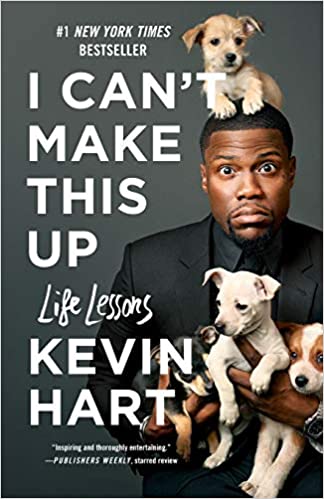
“One of the key factors for success— beyond work, talent, timing, relationships…—is the glue that holds all of these together— commitment…Keeping the promises you make to yourself and others.”
Let me tell you this— I was not always a Kevin Hart fan.
I did what I’ve done so many times: I saw a few things him in TV spots or trailers for movies, and I extrapolated— this guy isn’t for me. I felt he was overrated. His humor is for little kids, maybe moms. But not for me. In short, I judged Kevin Hart by his tiny little cover, and for that, I am sorry.
In my defense, when Kevin Hart started stand-up in Philly, he went on stage as a character that he called– and I’m not joking– “Lil Kev’ The Bastard.” So, he sort of made his own bed there.
Lucky for me, I stumbled into a couple of recent, long-form interviews of Hart, and he changed my mind. I got a sense of his story— growing up poor in Philadelphia, and working relentlessly for the next decade plus to become what he is today. And I also saw another kind of humor–an improvisational, very human sort of humor– which I found endearing. Those interviews led me to look back to his early stand ups, and I realized, they are actually pretty good. I don’t think they are right on the nose for me (and it’s hard to miss my nose), but still, pretty funny.
So now that I liked his story, and I liked his comedy, I knew I wanted to learn more. Anytime you have a person that went from poor to successful, there are things to gain. So I grabbed the book.
One thing I loved about the book was what a testament to practice and mentorship and growth it is. Hart was definitely funny coming into comedy, but in the way of joking around with friends. He had a little stage presence, but he was raw. Even after his first couple of years, his act was a little bit jokey, not well crafted, an not honest (recall “The Bastard”).
But he got himself around the right people. And he made them believe. And then he listened to them, learned from them, and ultimately did not let them down.
“When you’re trying to make it, you’re not judged by your talent but by your potential. And that potential is all about your willingness to listen, learn, and improve.”
Another thing I loved was his work ethic and resilience. The amount of times he was told no or that he wasn’t good enough, or that he screwed up, and that he kept bouncing back. It was inspiring and it was a great story.
“That’s the biggest difference between the amateur and the professional, between the wannabe and the star…The unsuccessful get halfway to the finish line, then turn around. The successful get halfway, and then keep going. Both run the same distance, but only one makes it to the finish line.”
There were several other comedian bios I read and liked—George Carlin, Bedwetter (Sarah Silverman), Bossy Pants (Tina Fey), Jamie Foxx. But I found Hart’s to be the best. If you want Hart but a shorter, Clifnotes sort of version, start with The Decision. But ultimately, I found that book a little emptier.
The Everything Store, Brad Stone
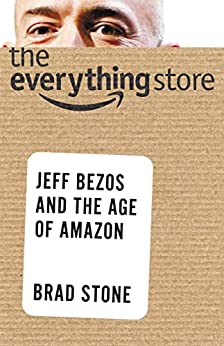
“‘Amazon isn’t happening to the book business,’ he likes to say to authors and journalists. ‘The future is happening to the book business.’”
I read a ton business bios this year—Twitter and Instagram and Starbucks and Trader Joe’s and Netflix, several others. I thought those other ones were good, for sure. But due to no fault of their own, the most interesting and— in some ways— vexing founder for me is definitely Bezos. I found myself challenged by this book— even a little bit scared.
Why scared? Well, its quotes like the one above. That he feels that he— or his company as a manifestation of him— is the future, or is aligned with it. And in that way, there is a eerie feeling about Bezos. About his energy towards the customer and long-term and all of it. It feels to me dogmatic, and at times, almost maniacal. (One of the first names he thought of for the company was Relentless.com). It calls to mind the Peter Thiel quote about the only difference between a cult and a successful start up— the start up is right about it’s crazy, singular truth. That makes me uncomfortable.
That said, there are still all of these great things to take from Bezos. One thing I really liked is where he looked at all of these companies and he decided there is a cool v not cool set of attributes you can be as a company. One set of attributes, if you have them, make you an unliked, uncool, evil sort of company. The other set, makes you loved.
“Rudeness is not cool. Defeating tiny guys is not cool. Close-following is not cool. Young is cool. Risk-taking is cool. Winning is cool. Polite is cool. Defeating bigger, unsympathetic guys is cool. Inventing is cool. Explorers are cool. Conquerors are not cool. Obsessing over competitors is not cool. Empowering others is cool….”
And it goes on.
The companies who are cool, at least back in 2013: Apple, Nike, Disney. All well-liked by their customers. Companies who are not cool— meaning more feared than liked, seen as a bad guys—Wal-Mart, Microsoft, Goldman Sachs. I see a lot of truth in his list. But I also fear that Amazon (and Apple) have probably started to migrate towards the bad guys.
On a personal level, one of the best lines from Bezos is in a speech he gave in 2010. He tells this story about this one time he is driving with his grandparents and his grandma is smoking. And sort of in a precocious way, he says to his grandma, you know each puff of cigarettes you smoke takes 2 minutes off your life? You’ve taken nine years off your life so far! His grandma burst into tears.
Right away, his grandfather pulls the car to the side of the road, looks back at Jeff and says to him, stern but calm, Jeff—one day you’re going to understand a simple truth: that it’s harder to be kind than clever. A lesson I am only just starting to learn, myself.
Bezos goes on in the speech to explain that there are gifts and there are choices. Gifts are useful and can be used for great things. But “gifts are easy— they’re given after all.” Cleverness is a gift. But choices are harder and more important. You have a duty to take them seriously. Kindness is a choice.
“Will you be clever at the expense of others,” Bezos asks, “or will you be kind? … When you are 80 years old and in a quiet moment of reflection narrating for only yourself the most personal version of your life story, the telling that will be most compact and meaningful will be the series of choices you have made. In the end, we are our choices.”
And when you hear him say that, you think to yourself— well this is a good guy. So I am mixed on Bezos. But the book, I am not mixed on—it’s great.
Founders At Work, Jessica Livingston
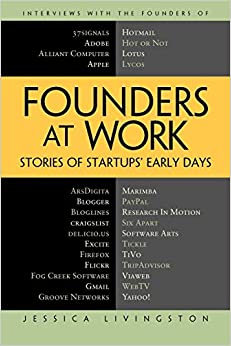
“Over the years, I’ve learned that the first idea you have is irrelevant. It’s just a catalyst for you to get started. Then you figure out what’s wrong with it and you go through phases of denial, panic, regret. And then you finally have a better idea and the second idea is always the important one.”
An interview-style book here. It’s like an anthology of tiny bios on early-days, 1990s entrepreneurs. It was a lot of fun.
Jessica Livingston (founder of Y-Cominator— a startup incubator that funded companies like Airbnb and Dropbox) interviews the Web 1.0 founders– Steve Wozniak, Paul Graham. So basically the people who invented the internet. The early start-ups. And what they had to go through convincing an analog world to adopt a digital frame of mind.
It’s a lot like a bunch of podcasts, only its strewn together by Livingston, who has as much experience as anyone talking to founders and building companies. Because of that, she can come to conclusions like the following:
“I’d say determination is the single most important quality in a startup founder. If the founders I spoke with were superhuman in any way, it was in their perseverance.”
Reminds me of what Cuban said: “It’s not about money or connections-it’s the willingness to outwork and out-learn everyone…”
I listened to the book, picking out first my favorite people I already knew a little— Steve Wozniak (Apple) and David Heinemeier Hansson (37 Signals) and Ev Williams (blogger, Twitter) and Caterina Fake (Flickr), for instance. And then getting to people I’d never really heard of — like Stephen Kaufer (TripAdvisor) and Mike Ramsay (TiVo). My favorite interviews were probably Max Levchin (PayPal), Wozniak and Paul Graham (ViaWeb, Y-Combinator). The price of the book is worth just those three.
Born A Crime, Trevor Noah (Amazon)
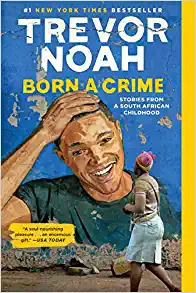
“We spend so much time being afraid of failure, afraid of rejection. But regret is the thing we should fear most. Failure is an answer. Rejection is an answer. Regret is an eternal question you will never have the answer to. “What if…” “If only…” “I wonder what would have…” You will never, never know, and it will haunt you for the rest of your days.”
Trevor Noah is also someone I didn’t really give a chance right away.
Frankly, at first, I felt like he was a huge step down from Jon Stewart at the Daily Show. But I started watching some of his videos during the pandemic—— stand-up and clips from the show, and various times when he would take social stands—, and I was turned. I thought: wow, this guy is a smart and funny, but also really seemed to be a good guy— similar to Stewart, actually. (If you missed it, he just gave the White House Corespondent Speech).
Noah was brought up in South Africa, during apartheid, in horrible conditions. He was ‘born a crime,’ because his father was white and his mother black, and this was illegal in the township of Soweto. The book— like Noah— is light and funny, but with a layer of depth and weight.
My favorite pieces of the book were the early parts, where he talked about the conditions of South Africa, and the history. And the second half of the book, where, a teenager, and getting quite good at DJing, he started to learn lessons of the ‘the hood’ as compared to America. And lessons about trying and not trying. It was very interesting.
“We tell people to follow their dreams, Noah wrote, “but you can only dream of what you can imagine, and, depending on where you come from, your imagination can be quite limited.” And then later, “People love to say, “Give a man a fish, and he’ll eat for a day. Teach a man to fish, and he’ll eat for a lifetime.” What they don’t say is, “And it would be nice if you gave him a fishing rod.” That’s the part of the analogy that’s missing.”
It comes to a chilling climax at the end. So brace for it.
Eminem, The Way I Am
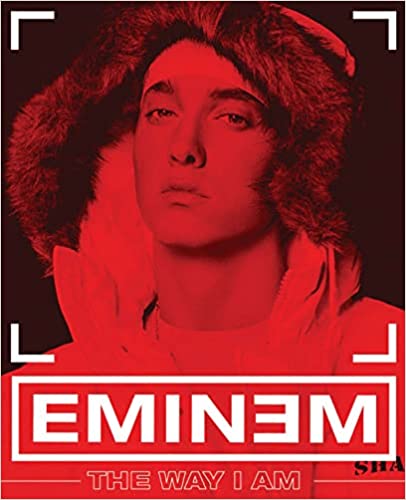
“Sometimes I’m real cool, but sometimes I could be a real asshole. I think everyone is like that.”
Remember Eminem in the beginning? When he came out and he was blonde, and then all of these guys started putting Sun In in their hair to look like him? It’s funny that the whole image was a result of an accident:
“I was taking a walk with Royce [and we were both on] ecstasy, we went to a store and brought a bottle of hydrogen peroxide, woke up, and I did not remember anything.”
The book was pretty refreshing as far as autobiographies go. The reason is— it’s not refined and tied with a bow, the way that, for instance, the Will Smith book felt to me at times. He seems to be just sort of talking, like he just spoke this all into a tape recorder and had it transcribed. And sure, there is a difference, probably, in “refinement” in the two guys in reality, so you might expect some difference in the writing— but not as big as the gap that shows up. My personal take: I think Eminem is concerned with being real. I think Will is more concerned with portraying an image (nothing against Will— this can be said of a lot of bios).
Two things I didn’t know about Em. First, his best friend, Proof (aka Deshaun Holton), was murdered in 2006. This was his guy. He was the dude that inspired the role of Future—played by Mekhi Phifer— in 8 Mile. And he was the first guy that really believed in Em. He was the best man at his wedding.
““Proof,” Eminem wrote to his departed friend, “no matter how much time passes, not a day goes by that I don;’t think of you..I would not be where I am today without you, and we both know it.” “Proof had this ability, Em said elsewhere, “to not only nurture my talent, but to see that diamond in the rough when a million people could be looking at the same thing…and just not see it.”
The second thing I liked about this book was that, despite what you might think, Eminem wasn’t very good at first. He first came to rap albums from his uncle who, by the way Em describes him, sounds a bit like Uncle Rico. He started rapping at school, but mostly to kids saying it wasn’t for him. Proof was one of the first dudes to tell him he was good. But that was only after thousands of hours of writing and practice.
As he told it elsewhere:
Why did I become who I was? First I was a fan of the music, before I even thought about rapping. LL cool J was the one who made me first start writing rhymes. I was like 12, 13 maybe. And it sucked, I wasn’t good, but I had to keep practicing, practicing, and practicing. I gave it up for a little while then I started up again when I was like 15. Started be able to kind of put songs together, and then I was like, I’m starting… I was never really good at much else. Once I found out I was decent at something, I just kind of focused and went for it.
He’s a great example of someone who get absolutely obsessed with something—even something that people who looked like him weren’t supposed to do— writes and listens to it all day everyday, and eventually gets good.
Did he have zero talent? Of course, not. But he eeked it out. And, similar to Steve Martin or John Krasinksi, he was like a half an inch from quitting. And then he got his break.
Act like a Success, Steve Harvey
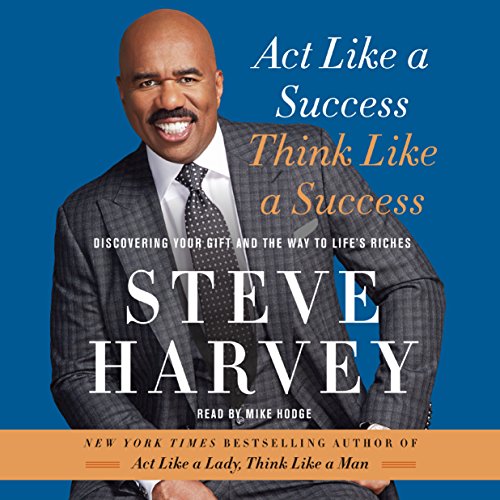
“If you do what you’ve always done, you will not get better.”
This is part short autobiography, and bigger part self-help / rules for success kind of book. Like Cuban, Harvey uses stories and examples from his own life, and others, to make compelling points about achievement, perseverance, and mindset. And he does it in an entertaining, funny way— as only Harvey can do.
Harvey took a tough road to being a comic. He worked at some sort of car business, if I remember correctly, but had this interest in comedy. So he went to a local open-mic contest, and won it. (Incidentally, Kevin Hart had a similar kind of start, selling shoes at Foot Locker). When Harvey decided he was going to be a full-time comedian, his boss, colleagues and friends mostly thought he was crazy. Except a couple, including his father— whom would be vital to his self-belief.
It took him a few years to make enough money where he wasn’t sleeping in his car on the road. He started low, but Harvey had a plan. He says in his book to view each stage like a temporary vehicle—- one that you will ride to get to the next, higher ladder rung— as long as you can learn something from it.
“Don’t ever be afraid to put yourself in a lesser position so that you can learn something from someone who knows more.”
The book is a great story of how Harvey got to where he is, but also how he thinks about getting what you’re after. I found it fun, insightful, and inspirational.
Rafa, Rafa Nadal (w/ John Carlin)
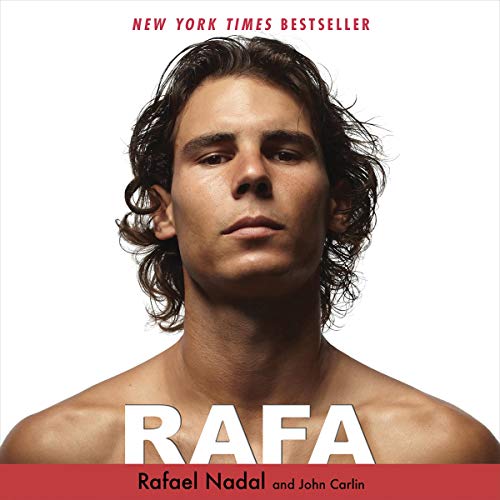
Let me first warn you: Rafa is my favorite tennis player, and one of my favorite athletes of all time. So there might be some bias on my end for how much I liked this book.
Rafa’s the only athlete— maybe Tiger can still do it— that can emotionally tie me to the outcome of a match. I used to be, for instance, married to the outcome of a Ravens game. If they lost, I was impacted. Not just disappointed for an hour. Like, I wouldn’t talk to people for days. It was pretty bad.
Fortunately, for my friends, that doesn’t happen anymore. I watch a sporting event, it’s fun, I am rooting for one team or another, but whatever the outcome, my mood and identify are unaffected. You can safely speak to me.
Except with Rafa. When he wins, I get energized and even emboldened; when he loses, I’m disappointed, sometimes even upset.
But even if you aren’t a Rafa faithful, you might be attracted to the book. It tells the story of a guy that I didn’t know before. I didn’t realize, for instance, how close Rafa was to his family—how much he needs them to be close. “However great your dedication, you never win anything on your own,” he said. And his family truly is like a team surrounding him— his uncle is his coach, his father is his business partner, his mother and sister fly to almost every big match.
It’s also funny that this tank of a warrior-athlete has some almost comical fears. He’s afraid of the dark, for instance. And thunderstorms. “He’s a person who needs to be in control of everything,” said his trainer.
Unquestionably, the best part of the book is how he breaks down his matches with Federer.
Here’s a crazy fact: Rafa and his trainer (uncle Tony) actually believe that Federer is the more technically sound and better player. That if they are both hitting great, Federer will be hitting better.
“When Federer has these patches of brilliance, the only thing you can do is try and stay calm, wait for the storm to pass. There is not much you can do when the best player in history is seeing the ball…and hitting with power, confidence, and laser accuracy.”
The best player in history— can you imagine Michael Jordan saying something like that? Not a chance. And yet, there’s something endearing about it. To me, it shows humility, awareness, and an even more inspiring toolkit than a Michael Jordan.
Rafa believes— and history has confirmed–that if he’s going to beat the more gifted Federer, it won’t come from skill. It’s going to have to come from grit and mentality and resilience. The ability to stay in points. To make Federer feel like he has to put Rafa away three, four, or five times in the same point.
“Tennis is, more than most sports, a sport of the mind,” Rafa says, “it is the player… who manages to isolate himself best from his fears and from the ups and downs in morale..who ends up being world number one.”
After reading that, I realized why I liked Rafa most. Because he’s an example of how heart beats body. Resilience over skill. Persistence over talent. Sure, he says, Federer is the better technical player. But, fuck it, I’ll beat him with will.
That’s something I can get behind.
Non-bios – Psych, Behavior, Entrepreneurship, Nutrition, Creativity, Self-Help
Think Again, Adam Grant
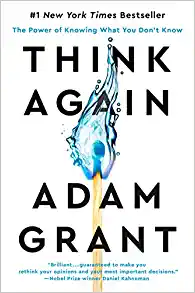
“This book is an invitation to let go of knowledge and opinions that are no longer serving you well, and to anchor your sense of self in flexibility rather than consistency.”
Grant’s books have the character of my “All-Time” great books— they either teach you some concept that is completely new, or they make you rethink a concept you thought you knew. Think Again does both of those things. (I mean, it’s literally in the title).
The main idea of the book is this— we’re often told to go with our gut. That whatever our first thought is probably the right one. Follow your instincts. But, in a lot of situations, that turns out to be wrong.
“It’s a sign of wisdom to avoid believing every thought that enters your mind. It’s a mark of emotional intelligence to avoid internalizing every feeling that enters your heart.”
Grant shows that people who perform the best in terms, for example, long-term prediction or negotiation or teaching— they all rethink their assumptions, as opposed to going with instinct. So it almost seems like the anti-Blink or Gary Klein’s books for the academics. (But it’s not really).
And these great performers, they seem to do “rethink” systematically. And this might actually be a requirement. Because if you’ve been doing things for a while, or even for a little, and you like that you’re doing it, it can tend to get you to think it’s right, without evaluating it fairly.
The balance that one needs to strike—particularly me— is between “overthinking” (me) and rethinking (me, again). At some point, you need to make a decision, but you want it to be a thoughtful one. And Grant talks about this balance, according to research.
You want to rethink beliefs (how you view the world) strategies and opinions (things you see as true), Grant says, but hold strong to values (the things that are important to you).. For example, I value healthy eating— so that’s something that maybe needs less frequent rethinking. But the best way to get there— the best diet, for example, that should be rethought frequently.
“After all,” Grant says, “the purpose of learning isn’t to affirm our beliefs; it’s to evolve our beliefs.”
Small Giants, Bo Burlingham
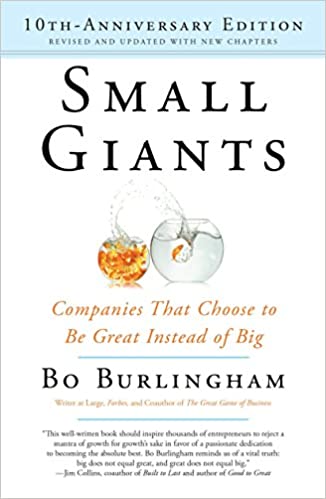
The main idea of the book is this: once a company becomes successful, especially early on, it develops this idea internally, and pressure externally, that rapid scale is automatically a good thing. The author, an editor-at-large of Inc Magazine, feels this idea, though common, might be wrong.
So Burlingham decides to look at the very best companies, who, despite have more demand than supply, and despite being the top in their industries (in terms of, for example, sustained annual profit margin), have been able to stay (usually making the specific decision to stay) small and great for years and years.
These are what he calls “Small Giants.” The companies that, as Bo puts it, “chose greatness over growth.”
“For any competitive individual…it becomes quite tempting to chase after growth…the financial indicators are, after all the most convenient, and objective, measures of success available. It’s easy to fall into the trap of thinking that if you’re maximizing growth, you’re also maximizing success. It feels like you’re winning. And who doesn’t like to win?”
I found the stories of the companies interesting— Clif Bar and Anchor Steam Beer and Union Square Hospitality (Shake Shack group). But I also thought about the approach, and thinking about the various choices they had to make, and values they had to hold.
“That speaks to the relationships that small giants have with their suppliers and customers…it’s the managers and employees.. they are the company’s first priority…for all of the extraordinary service and enlightened hospitality that the small giants offer, what really sets them apart is their belief that the customer comes second.”
To me, it’s the sort of book that gets you to look at a certain, new perspective, and then gives examples of how this might work. I took a lot from it. (Thanks to Tim Ferriss for pointing me to it).
Crushing It, Gary Vaynerchuck
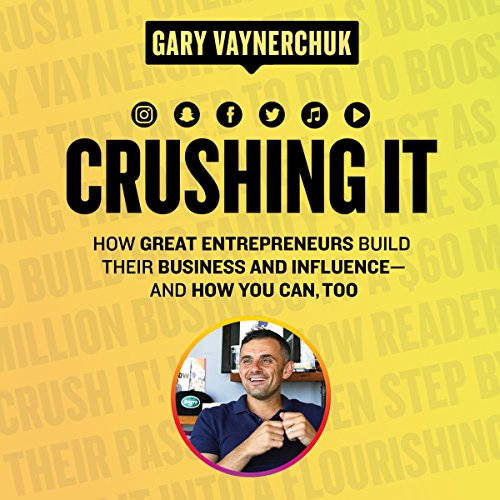
“When it comes to professional opportunities, this is the best time to be alive in the history of humankind.”
Gary V can be a little tough to swallow.
He’s a little loud, a little hyper, seems a little too sure of himself. It can all come together to make him look like sort of a schmuck. At least to the uninitiated.
This is not just a Gary V problem. It seems to be a problem of those that are unapologetic about self-promotion and marketing of their services. The same thing happened to me with Tony Robbins, for instance. You see those old infomercials and you’re just like, this dude is a clown.
But here’s the thing— Tony is not a clown (legal infractions aside). He’s legit as hell. (Here’s my TR experience). And neither is Gary V. They are both smart, pretty funny, often insightful, and most of all, they are inspirational.
Unfortunately, the big paradox is that you can only learn that by really diving into their material–the very thing by which you are repulsed. This year, I finally got through that repulsion. And, just like Ernie, I was wrong again.
Crushing it is the ‘updated’ version of Crush It, which was also a NYT best-seller. The book hit that trifecta: it was entertaining, it was tactical, and it was inspiring. I came out of the book with a new respect for Gary V, some ideas, and increased hunger.
Two things I learned.
One, while on social media Gary seems to be one of those “we’ll buy your gold for CASH” sorta operations, he’s the opposite. The things he preaches in marketing and building brand, are the same things that I would preach (if I was trying to persuade people) about diet and exercise: there’s no shortcuts; low and slow is the only reliable route to success.
“You’re going to go through a time where you’re not going to make any money. It’s not going to be a week, it’s not going to be a month, it’s not going to be one year. It’s going to be years. And during that time, if you don’t love what you do, it’s going to be very hard to stick it out… you’re going to be that much more likely to quit when shit’s hard.”
The second thing— more tactical. A lot of Gary’s point of view on how to build a name for yourself in social media is essentially in four steps:
(1) be authentic. It’s easy to tell a poser. Just be yourself and create a profile around a subject in which you are deeply interested or an expert in (ideally both).
(2) be entertaining or informative. You have to be either one or (ideally) both. If you’re neither, you’re not going to atttract people.
(3) engage with the community for your thing. Make authentic, and thoughtful comments on people’s pages. Message people. Meet them. Suggest stuff. Ask questions. Be interested.
(4) keep doing this for ten years. “In the first few years, you’re going to each shit.” This is what Gary says most people won’t do, even though it’s the only way to ensure progress— if your stuff is good.
“And what really matters,” Gary V says, “is a pretty short list: intent, authenticity, passion, patience, speed, work, and attention.”
How to Change, Katy Milkman
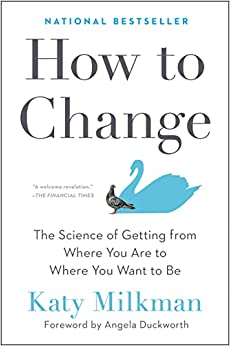
Milkman is a behavioral science professor from the University of Pennsylvania. She wrote How To Change with the intent of stating the state-of-the-art consensus ways to actually change what you do. And though I’ve read dozens of behavioral science books, I took several new things out of this one. (Nod to Jordan Goldberg for pointing me to it).
One concept I took out of this book is something called habit elasticity. Typically, we think of habits as being something you want to develop in the same way, at the same time, in the same context. For example, the best way to build a gym habit, we’re told, is to go everyday at the same time to the same place. But when Milkman tried this with 2500 Google employees, she was stunned to realize it was the more flexible gym goers whose habits lasted longer.
“Gogglers we’d encouraged [with money] to hit the gym at a consistent time…turned..into..inflexible automatons…if they couldn’t make it to the gym at their regular time, [they] were unlikely to go at all.”
Compare that to people who they paid to be more flexible with their gym times. They “kept working out a lot more at other times, too, not just at the time they’d said was most convenient.” This flexibility produced ‘sticker’ habits. Milkman said of the insight:
“I think this is one of the most important discoveries I’ve made in my research career.”
Another concept Milkman talked about was confidence— which got its own chapter. (A concept, by the way, I’ll talk about in depth in my forthcoming book, foodwise). Basically, to change you need to believe you can.
“Research confirms the obvious: when we don’t believe we have the capacity to change, we don’t make as much progress in changing.”
How do you become more confident? Help or teach others. This, Milkman shows, will actually build your own confidence in doing the thing for yourself.
All in all, Milkman gives the good with the bad and writes and entertaining, evenhanded, and at times, inspiring book about how to start changing.
Nine Things Successful People Do Differently, Heidi Grant-Halvorson
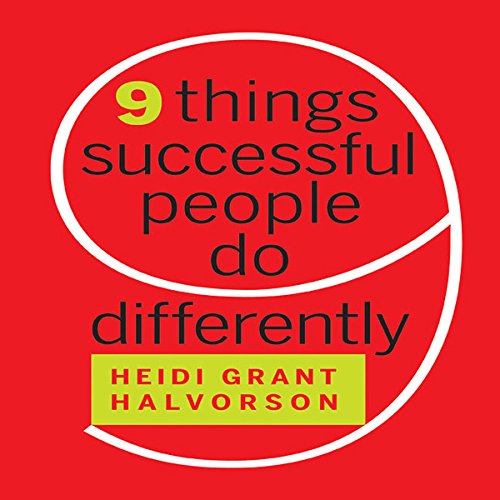
Staying with behavioral change here. This book is much more of a short (~100 pages) primer on behavioral change. So if you’re interested in the subject, but want to start off ‘easier’ than How To Change – I’d start here.
Halvorson is a psychologist and the associate director of Columbia’s Motivation Science Center. The Nine Things seem obvious if you just read the list— but, don’t make that assumption. The value is in how Halvorson explains them. She will have you thinking differently about how you pursue goals.
One of those counterintuitive bits is about confidence v. Unrealistic expectations. Halvorson talks about a study on weight-loss. Basically, a bunch of women on a weight loss plan were interviewed beforehand. There were asked two questions. The first was about confidence— are they confident that they will be able to succeed in losing weight. No surprise here— the women who were more confident in their ability to do it lost more. (We learned that above from Milkman).
But the second question was slightly different, and more interesting. The women were asked if they thought the road to success was going to be easy or difficult. The women who thought it was going to be a cinch—i.e. their confidence rose to cockiness— lost less weight (were less successful) than the women who expected it to be a tough road.
The conclusion Halvorson comes to is this— you want to be confident about your personal ability to persevere, but you also want to be real about the road ahead. Because it is going to be tough. And the more you can shift your expectations to that fact, the better you’ll be able to withstand the obstacles when they inevitably arise.
What To Eat, Marion Nestle
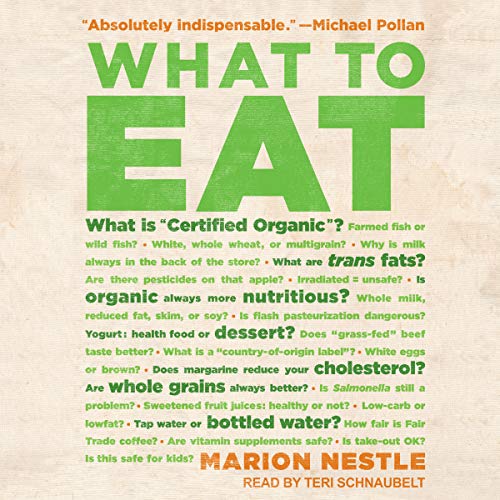
Marion Nestle is a former professor of nutrition, food studies and public policy NYU, and an author of a handful of popular books about intersection of nutrition and public policy. But “What To Eat” is all about food and what science suggests about what we need to eat to be healthy. And it’s very readable for the average bloke. And for me—quite enjoyable.
Here’s why I love this book, and nutrition books like it, of which there are few. Most diet books are written in an argument format. They are making an argument on what diet they think you should adopt, usually based on a sliver of compelling, but limited data. It’s a pitch.
Take the keto diet, for example. Yes, there is some data on it— but it’s far from the consensus advice on what’s healthy. It’s experimental. So the author selling you a keto diet is trying to persuade you– like a lawyer might persuade a jury.
She is not there to report on what we (the global scientific community) currently agrees on. That takes a teacher– like Nestle.
Nestle writes it in that way we need more of—to teach rather than to persuade. She’s not selling a diet. She’s summarizing the current scientific consensus:
“An ideal diet is really very, very simple, and it applies to everybody across the board… My dietary advice would be eat less, move more; eat plenty of fruits and vegetables and whole grains; don’t eat much junk food: and enjoy what you’re eating. It’s just as simple as that, and that applies to everybody.”
We want it to be more than that— but it isn’t.
We want there to be some secret that’s keeping us unhealthy and unfit. If there was, then it would make sense— that’s why I’ve been eating this way, I just didn’t know about the secret formula yet. But there’s no secret that you need to uncover.
You can safely ignore those doomsday “what if I told you that everything you thought you knew about nutrition is wrong” folks. The consensus is not that. The consensus is much scarier, because it requires some accountability. It’s that, for many of us, our problem is not knowing what’s healthy— we generally know about salads and exercise. The hard part, is actually doing it.
Bottom line: If you want to know which foods to eat to lose the most weight in the least time— this ain’t your book. If you are looking for an edgy new way to experiment with your diet— I’m looking at you keto and carnivore and fasting and apple-cider vinegar cayenne diet books, don’t read this book.
But If you want to know what we (the world-wide scientific community) actually agrees on. If you want to follow sound, consensus science on which foods are healthiest. Read this book.
James Baldwin, Giovanni’s Room

“For I am—or I was— one of those people,” James Baldwin wrote, “who pride themselves in their willpower, on their ability to make a decision and carry it through. This virtue, like most virtues, is ambiguity itself. People who believe that they are strong-willed and the masters of their destiny can only continue to believe this by becoming specialists at self-deception. These decisions are not decisions at all— a real decision makes one humble, one knows that it is at the mercy of more things then can be named— but elaborate systems of evasion…”
When you read something like that, you know that you’re reading a master. Baldwin has that ability, like so many all-time novelists—Woolf, Salinger, Yates, Dickens— to put his finger on likenesses and pieces of character that are instantly recognizable. Without sounding preachy or arrogant, he adds insight into why people act like they do, and what it means.
But he’s distinctive in a few ways.
For one thing, his writing always seems a little bit sad. I don’t often find hope in what he writes, but I find truth, which, in a strange sense, is inspiring. In that way, it’s a little like the Lost Generation writers (Hemingway, Fitzgerald) who all feel a little unhappy, a little cynical, even nihilistic, but you’re learning.
Like being unplugged from the blissful Matrix into the scary but real world of the machines. You have these beautiful sentences, but they are describing something dark. Like roses lining a coffin.
“People who remember court madness through pain, the pain of the perpetually recurring death of their innocence; people who forget court another kind of madness, the madness of denial of pain and hatred of innocence; and the world is mostly divided between madmen who remember and madmen who forget.”
And a second thing— his writing is always with force and confidence. It feels like he knows what he is saying, but without sounding like a know-it-all. He’s seen it, perfectly dissected it, and we all know it’s true.
“For nothing is more unbearable once one has it,” Baldwin says, “than freedom.”
Art and Fear: Observations on the Perils (and Rewards) of Artmaking, David Bayles and Ted Orland
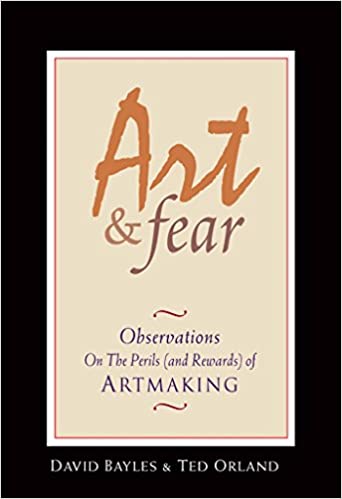
“Making art now means working in the face of uncertainty; it means living with doubt and contradiction, doing something no one much cares whether you do, and for which there may be neither audience or reward…Making the work you want to make means finding nourishment within the work itself.”
This book really got me.
I’ve listened to it twice already, and probably will listen to it once per year. (I chose listening because it feels more like a pep talk or lecture that way— which I like for this style of book). If you are in the process of, or are planning to be, creating something— anything: a book, a business, a drawing of a blue duck — read this book ASAP.
The two authors are what I think of as the best of both worlds— professors and working artists. So they are teaching about doing something that they have, not only studied, but done, and continue to do. To me, that’s the person to take advice from. Because not only have they ‘done,’ but they have thought about what allows them to ‘do’ in a broader, more specific way— a way you can only learn by trying to explain it to another. The result is that the book is covered with seasoned, declarative, battle-tested principles.
And it’s inspiring—but it’s not pie-in-the-sky kind of inspiration. That’s the crazy thing. It’s action-oriented and practical, sometimes very granular— but also motivates. It’s like that great coach or teacher or friend who gives it to you straight—including the details— but with a pat on the back. Like— hey, this is it, its tough, but it’s worth it, and you can do it. Now go get ‘em.
“But the important point here is not that you have— or don’t have— what other artists have, but rather that it doesn’t matter. Whatever they have is something needed to do their work— it wouldn’t help you in your work even if you had it. Their magic is theirs. You don’t lack it. You don’t need it. It has nothing to do with you. Period.”
Who Moved My Cheese?, Spencer Johnson.
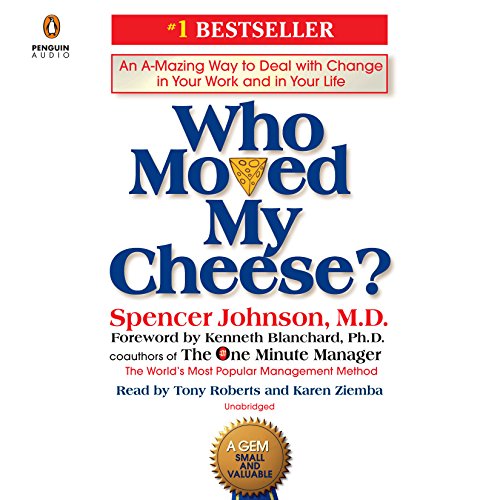
“I guess it’s better to initiate change while you can than it is to try to react and adjust to it. Maybe we should move our own Cheese.”
Spencer Johnson may be the most interesting person that nobody knows. How else would you explain the lack of awareness of a guy who wrote or cowrote two of the best-selling books of all time?
Johnson started his career as doctor. He was quite successful by all accounts, but then, a feeling came over him— he wasn’t where he wanted to be. He kept seeing the same patience, not follow his advice, and be back a year later, sicker then they were before. He felt like what he was doing didn’t serve the purpose he wanted to— and so what did he do? He left his career and decided to start writing children’s books.
His first books taught lessons to kids through stories of famous people. For example, “The Value of Courage,” by relaying the story of Jackie Robinson, or “The Value of Understanding” with the story of Margaret Mead. In the meantime, he met Ken Blanchard at a dinner.
Blanchard — a well-known business speaker and writer— wanted to work with Johnson because of his prowess in simple, kid-like stories to explain complex ideas. Eventually they wrote a book called The One Minute Manager, which went on to sell 15 million copies.
After that, Johnson started lecturing. And in those lectures, he had made up a story— it was the story of a few rats and the exchanges and thoughts amongst them as they vied for their ‘piece of cheese’— and allusion to whatever goal or success or happiness one is after. That story was so popular in his lectures, he turned it into this book.
The crazy thing though, is how long he spent on this tiny book. About a decade. Why did it take so long? Because he was determined to live it first— it had to be authentic, he said. He wanted to make sure everything he was saying was as true as he knew and could verify in his own life. The result is another of the best-selling books of all time— this one selling over 30 million copies.
But the reason I think it’s great, is not based on it’s success. It’s based on what is behind it.
When you’re getting lessons in a self-help book, they are only as strong as either the people referenced in the book—sources for claims made—or the author him/herself, and the life that author led. Is this the kind of person who has lived how you want to live? If so, you read the book and take it to heart. If not, ditch it.
To me, Spencer Johnson is that kind of guy.
Pro tip: If you get the book, get the audio version too. Since at the end of it, Spencer Johnson gets interviewed about the book and his life. It’s great.
Lightening Round: Six Quick Hitters that Are Really, Really Good Books
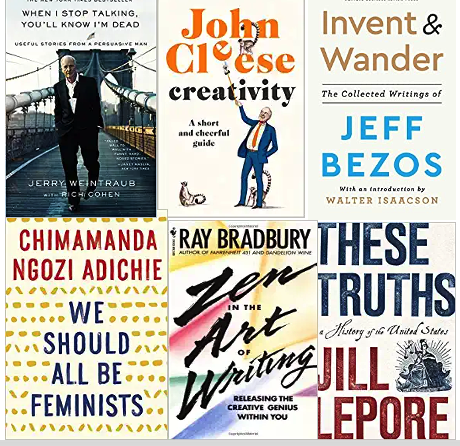
Creativity, John Cleese. From the creator of Monty Python, another definite audio selection, since Cleese reads it (and he’s English, which always adds something for me). It fits the great-book mold— entertains, informative, inspiring. Plus— it’s short. “When you’re being creative, there is no such thing as a mistake.”
Zen and the Art of Writing, Ray Bradbury. I hadn’t read Bradbury since middle school when I read Fahrenheit 451— and definitely didn’t understand it. This book is filled with charming, whimsical, sometimes funny, sometimes sad, but always insightful stories about how he became a writer and thought about writing and creativity. “That’s the great secret of creativity. You treat ideas like cats: you make them follow you.”
We Should all Be Feminists, Chimamanda Ngozi Adichie. This is another great (and very short) listen. It’s about a broader argument about what feminism actually means. You are a feminist if you recognize a problem and support equal rights for women. So, according to Adichie— and I find this persuasive— we are all feminists. “Culture does not make people. People make culture. If it is true that the full humanity of women is not our culture, then we can and must make it our culture.”
Invent and Wander, Walter Issacson, Jeff Bezos. Another Bezos special here. I thought this was really great. Though Bezos is a little scary-god-like, a lot of his perspectives are interesting and should probably be learned from. I did, after all, order 80% of these books from his website. “People who love all fields of knowledge are the ones who can best spot the patters that exist across nature.”
When I Stop Talking, You’ll Know I’m Dead, Jerry Weintraub. Had no idea about Weintraub before this and I am not even sure where I got the recommendation. But he’s a person who was revered by everyone from Elvis to Led Zepplin to George Clooney. It’s an entertaining book about a life of entrepreneurship, boldness, sales, and the entertainment business. A lot of fun. “This much I knew: as soon as you feel comfortable, that’s when it’s time to start over.”
Jill Lenore, These Truths. Just a great quote-heavy, and story driven history of the US framed as a very unlikely occurrence which came out of an experiment. I liked this a lot. “Can a political society really be governed by reflection and election,” Lenore asks, “by reason and truth rather than by accident and violence, by prejudice and deceit?”
Honorable Mentions
What’s an ‘honorable mention,’ anyway?
It’s just a level below the books above— either the book wasn’t as entertaining, informative or inspirational as the books that made The List— or all three. But I still am glad I read them, and I completed each one. If the above are As, these are Bs and B+s.
– Beyond Basketball (Coach K). This book was a good thing for Audio when you need a reminder of what’s important. I enjoyed getting a lot of Coach K’s story mixed in with what he feels he’s learned in his career.
– Mastery by George Leonard which was highly recommended. I found it interesting, and at times inspiring. I definitely took some things from it, but for some reason it didn’t quite rise to the level of impact on me that these other books did. Maybe I need to reread.
– Bloomberg on Bloomberg. An interesting story about one of the most successful people ever— billionaire, politician, philanthropist.
– Audacity of Hope, Obama. I liked this book, but it was more a statement of policy and opinion on the country then getting into his mind and story, which is what I really wanted. For me, Dreams of my Father was more to what I was looking for. I’ll definitely read longer one he recently published.
– In Search of Excellence,Tom Peters. I thought this was a little bit dense. I liked it, but you may have to be really into academic business type books to like it.
– You Are Wha You Do, Ben Horowitz. This book was solid, told interesting stories, and has advice by a former entrepreneur and current all-world venture capitalist. I didn’t find it quite as good as his first book, the Hard Thing About Hard Things, but definitely took some good things out of it. .
A final note—
I left out the specifically tactical. These are books that are helpful for a specific purpose— in this case marketing— but I didn’t consider them particularly great books outside of the tactics. If you’re looking for marketing related books that are tactical in nature, let me know. Books like Scientific Advertising by Claude Hopkins or How To Get The Most Out of What You’ve Got by Jay Abraham, or Blue Ocean Strategy, or The E-Myth Revisited.
Happy reading.
Justin
[1] How is peanut butter so good? I don’t get it. Peanuts are good, but they aren’t blindingly irresistible like their macerated end product. And no other nut or legume makes this sort of gargantuan leap. Almonds are good—probably about as good as peanuts. But in a head-to-head, almond butter gets absolutely torched by peanut butter. Some people might compare the peanut leap to that of the chickpea-to-hummus transformation. Don’t embarrass yourself. Hummus is great, but it’s not chickpea. It’s chickpea plus a whole lot of great shit— tahini, oil, spices, lemon juice. Peanut butter is one ingredient, the same one. But when it comes out of the grinder its like Urkel to Stefan.
[2] Dick Cheney had just shot someone by mistake on a hunting trip, and Miranda read some article about “other famous political shootings.”
[3] Quote from Einstein
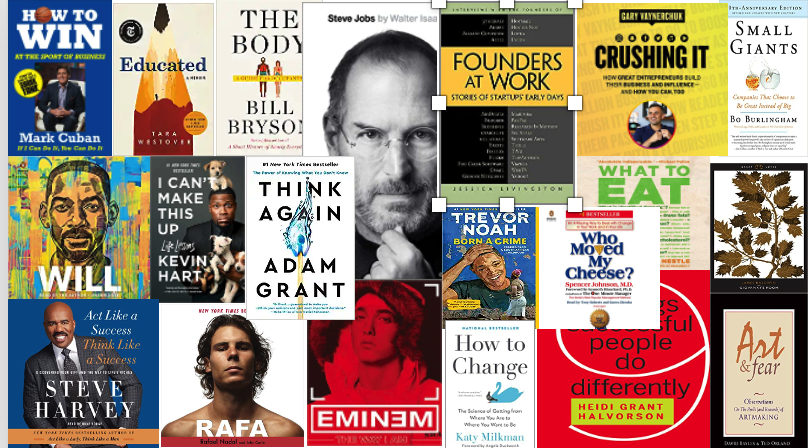
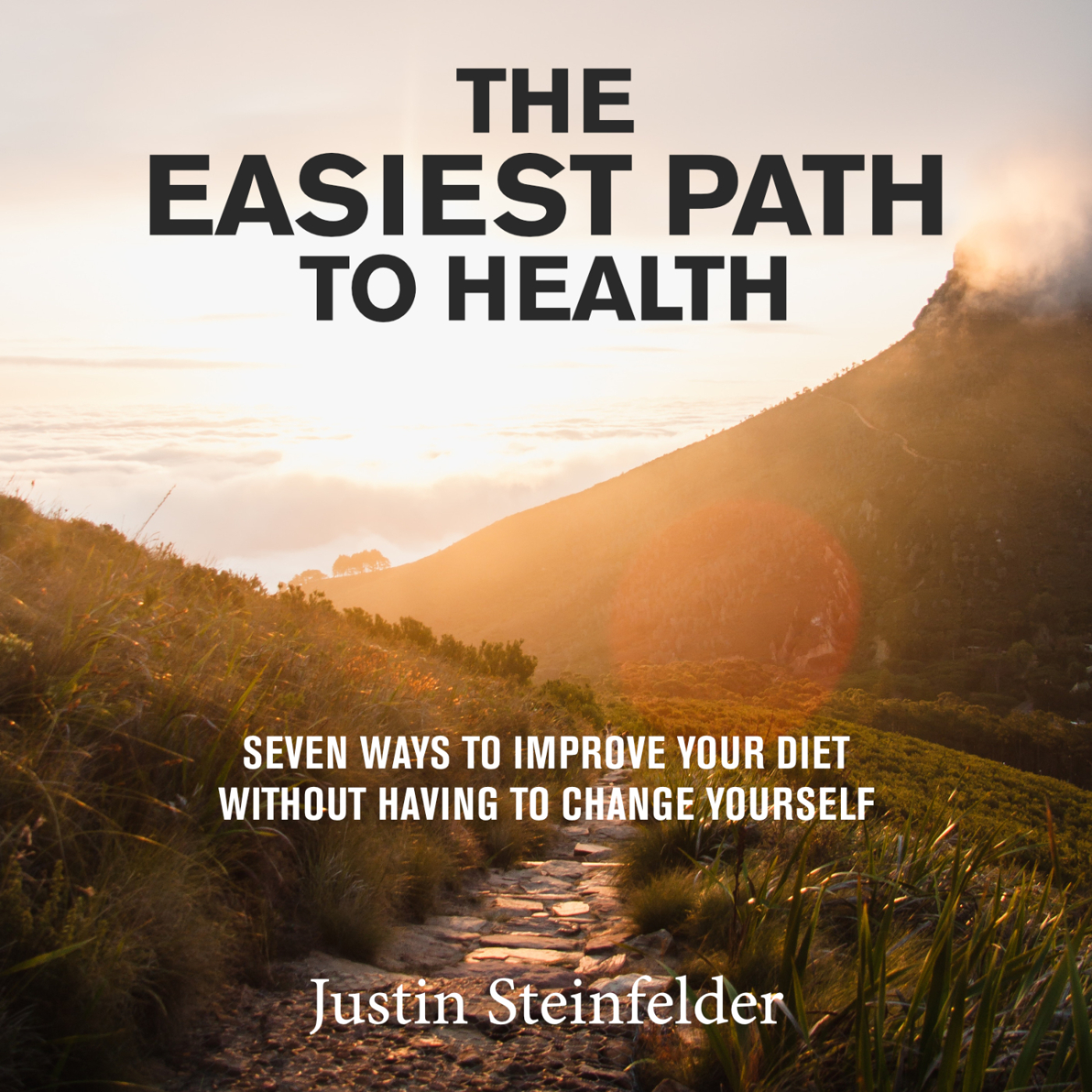

One Comment on “21 Great books from my 36th year (Plus six very good ones, and some honorable mentions).”
That was a long one but a good one. The best book that I am reading over and over is “It’s Just Anxiety”, How to Recover from Anxiety and Panic by Carl A James.
He had suffered all his life from anxiety and it kept him debilitated most of his life. He read a book that changed his life. He talks about the Voice of Fear and the Voice of Truth and Acceptance. The Voice of Fear is manipulating and tells us all the negative aspects of ourselves. The Voice of Truth and Acceptance is the positive aspects of ourselves. We have to learn to accept ourselves the way we are. He gives the reader the tools to accept our fears and and steps to recover from allowing The Voice of Fear from dominating our thoughts. What you resist, persists. It really helps the people who are suffering with anxiety.
I’m using his steps when the Voice of Fear tells me hurtful things. It’s like the devil and the angel.
I highly recommend this book for people who suffer with anxiety and panic.
Love
The Mommy